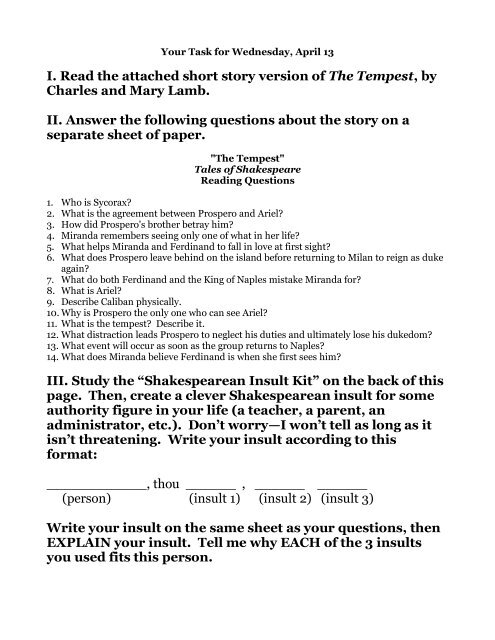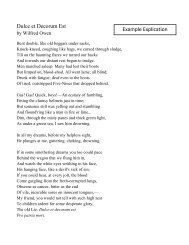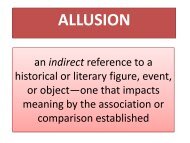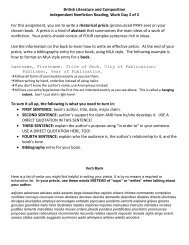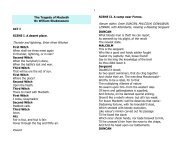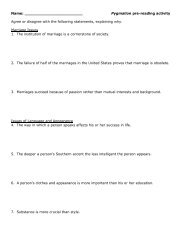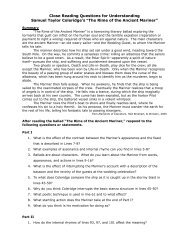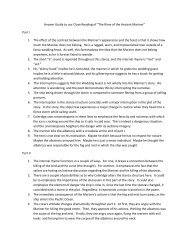You also want an ePaper? Increase the reach of your titles
YUMPU automatically turns print PDFs into web optimized ePapers that Google loves.
Your Task for Wednesday, April 13<br />
I. Read the attached short story version of <strong>The</strong> Tempest, by<br />
Charles and Mary Lamb.<br />
II. Answer the following questions about the story on a<br />
separate sheet of paper.<br />
"<strong>The</strong> Tempest"<br />
Tales of Shakespeare<br />
Reading Questions<br />
1. Who is Sycorax?<br />
2. What is the agreement between Prospero and Ariel?<br />
3. How did Prospero's brother betray him?<br />
4. Miranda remembers seeing only one of what in her life?<br />
5. What helps Miranda and Ferdinand to fall in love at first sight?<br />
6. What does Prospero leave behind on the island before returning to Milan to reign as duke<br />
again?<br />
7. What do both Ferdinand and the King of Naples mistake Miranda for?<br />
8. What is Ariel?<br />
9. Describe Caliban physically.<br />
10. Why is Prospero the only one who can see Ariel?<br />
11. What is the tempest? Describe it.<br />
12. What distraction leads Prospero to neglect his duties and ultimately lose his dukedom?<br />
13. What event will occur as soon as the group returns to Naples?<br />
14. What does Miranda believe Ferdinand is when she first sees him?<br />
III. Study the “Shakespearean Insult Kit” on the back of this<br />
page. <strong>The</strong>n, create a clever Shakespearean insult for some<br />
authority figure in your life (a teacher, a parent, an<br />
administrator, etc.). Don’t worry—I won’t tell as long as it<br />
isn’t threatening. Write your insult according to this<br />
format:<br />
____________, thou ______ , ______ ______<br />
(person) (insult 1) (insult 2) (insult 3)<br />
Write your insult on the same sheet as your questions, then<br />
EXPLAIN your insult. Tell me why EACH of the 3 insults<br />
you used fits this person.
Shakespearean Insult Kit<br />
To construct a Shakespearean insult, combine one word from each of the three columns below, and preface it with "Thou."<br />
Column 1 Column 2 Column 3<br />
artless base-court apple-john<br />
bawdy bat-fowling baggage<br />
beslubbering beef-witted barnacle<br />
bootless beetle-headed bladder<br />
churlish boil-brained boar-pig<br />
cockered clapper-clawed bugbear<br />
clouted clay-brained bum-bailey<br />
craven common-kissing canker-blossom<br />
currish crook-pated clack-dish<br />
dankish dismal-dreaming clotpole<br />
dissembling dizzy-eyed coxcomb<br />
droning doghearted codpiece<br />
errant dread-bolted death-token<br />
fawning earth-vexing dewberry<br />
fobbing elf-skinned flap-dragon<br />
froward fat-kidneyed flax-wench<br />
frothy fen-sucked flirt-gill<br />
gleeking flap-mouthed foot-licker<br />
goatish fly-bitten fustilarian<br />
gorbellied folly-fallen giglet<br />
impertinent fool-born gudgeon<br />
infectious full-gorged haggard<br />
jarring guts-griping harpy<br />
loggerheaded half-faced hedge-pig<br />
lumpish hasty-witted horn-beast<br />
mammering hedge-born hugger-mugger<br />
mangled hell-hated joithead<br />
mewling idle-headed lewdster<br />
paunchy ill-breeding lout<br />
pribbling ill-nurtured maggot-pie<br />
puking knotty-pated malt-worm<br />
puny milk-livered mammet<br />
qualling motley-minded measle<br />
rank onion-eyed minnow<br />
reeky plume-plucked miscreant<br />
roguish pottle-deep moldwarp<br />
ruttish pox-marked mumble-news<br />
saucy reeling-ripe nut-hook<br />
spleeny rough-hewn pigeon-egg<br />
spongy rude-growing pignut<br />
surly rump-fed puttock<br />
tottering shard-borne pumpion<br />
unmuzzled sheep-biting ratsbane<br />
vain spur-galled scut<br />
venomed swag-bellied skainsmate<br />
villainous tardy-gaited strumpet<br />
warped tickle-brained varlet<br />
wayward toad-spotted vassal<br />
weedy unchin-snouted whey-face<br />
yeasty weather-bitten wagtail
<strong>The</strong> Tempest<br />
from Tales of Shakespeare<br />
by Charles and Mary Lamb<br />
THERE was a certain island in the sea, the only inhabitants of which were an old man,<br />
whose name was Prospero, and his daughter Miranda, a very beautiful young lady. She came<br />
to this island so young, that she had no memory of having seen any other human face than<br />
her father's.<br />
<strong>The</strong>y lived in a cave or cell, made out of a rock; it was divided into several<br />
apartments, one of which Prospero called his study; there he kept his books, which chiefly<br />
treated of magic, a study at that time much affected by all learned men: and the knowledge<br />
of this art he found very useful to him; for being thrown by a strange chance upon this<br />
island, which had been enchanted by a witch called Sycorax, who died there a short time<br />
before his arrival, Prospero, by virtue of his art, released many good spirits that Sycorax had<br />
imprisoned in the bodies of large trees, because they had refused to execute her wicked<br />
commands. <strong>The</strong>se gentle spirits were ever after obedient to the will of Prospero. Of these<br />
Ariel was the chief.<br />
<strong>The</strong> lively little sprite Ariel had nothing mischievous in his nature, except that he took<br />
rather too much pleasure in tormenting an ugly monster called Caliban, for he owed him a<br />
grudge because he was the son of his old enemy Sycorax. This Caliban, Prospero found in<br />
the woods, a strange misshapen thing, far less human in form than an ape: he took him<br />
home to his cell, and taught him to speak; and Prospero would have been very kind to him,<br />
but the bad nature which Caliban inherited from his mother Sycorax, would not let him learn<br />
anything good or useful: therefore he was employed like a slave, to fetch wood, and do the<br />
most laborious offices; and Ariel had the charge of compelling him to these services.<br />
When Caliban was lazy and neglected his work, Ariel (who was invisible to all eyes but<br />
Prospero's) would come slily and pinch him, and sometimes tumble him down in the mire;<br />
and then Ariel, in the likeness of an ape, would make mouths at him. <strong>The</strong>n swiftly changing<br />
his shape, in the likeness of a hedgehog, he would lie tumbling in Caliban's way, who feared<br />
the hedgehog's sharp quills would prick his bare feet. With a variety of suchlike vexatious<br />
tricks Ariel would often torment him, whenever Caliban neglected the work which Prospero<br />
commanded him to do.<br />
Having these powerful spirits obedient to his will, Prospero could by their means<br />
command the winds, and the waves of the sea. By his orders they raised a violent storm, in<br />
the midst of which, and struggling with the wild sea-waves that every moment threatened to<br />
swallow it up, he showed his daughter a fine large ship, which he told her was full of living<br />
beings like themselves. "O my dear father," said she, "if by your art you have raised this<br />
dreadful storm, have pity on their sad distress. See! the vessel will be dashed to pieces. Poor<br />
souls! they will all perish. If I had power, I would sink the sea beneath the earth, rather than<br />
the good ship should be destroyed, with all the precious souls within her."<br />
"Be not so amazed, daughter Miranda," said Prospero; "there is no harm done. I have<br />
so ordered it, that no person in the ship shall receive any hurt. What I have done has been in<br />
care of you, my dear child. You are ignorant who you are, or where you came from, and you<br />
know no more of me, but that I am your father, and live in this poor cave. Can you
emember a time before you came to this cell? I think you cannot for you were not then<br />
three years of age."<br />
"Certainly I can, sir," replied Miranda.<br />
"By what?" asked Prospero; "by any other house or person? Tell me what you can<br />
remember, my child."<br />
Miranda said: "It seems to me like the recollection of a dream. But had I not once four<br />
or five women who attended upon me?"<br />
Prospero answered: "You had, and more. How is it that this still lives in your mind? Do<br />
you remember how you came here?"<br />
"No, sir," said Miranda, "I remember nothing more."<br />
"Twelve years ago, Miranda," continued Prospero, "I was duke of Milan, and you were a<br />
princess, and my only heir. I had a younger brother, whose name was Antonio, to whom I<br />
trusted everything: and as I was fond of retirement and deep study, I commonly left the<br />
management of my state affairs to your uncle, my false brother (for so indeed he proved). I,<br />
neglecting all worldly ends, buried among my books, did dedicate my whole time to the<br />
bettering of my mind. My brother Antonio being thus in possession of my power, began to<br />
think himself the duke indeed. <strong>The</strong> opportunity I gave him of making himself popular among<br />
my subjects awakened in his bad nature a proud ambition to deprive me of my dukedom:<br />
this he soon effected with the aid of the king of Naples, a powerful prince, who was my<br />
enemy."<br />
"Wherefore," said Miranda, "did they not that hour destroy us?"<br />
"My child," answered her father, "they durst not, so dear was the love that my people<br />
bore me. Antonio carried us on board a ship, and when we were some leagues out at sea, he<br />
forced us into a small boat, without either tackle, sail, or mast: there he left us, as he<br />
thought, to perish. But a kind lord of my court, one Gonzalo, who loved me, had privately<br />
placed in the boat, water, provisions, apparel, and some books which I prize above my<br />
dukedom."<br />
"O my father," said Miranda, "what a trouble must I have been to you then!"<br />
"No, my love," said Prospero, "you were a little cherub that did preserve me. Your<br />
innocent smiles made me bear up against my misfortunes. Our food lasted till we landed on<br />
this desert island, since when my chief delight has been in teaching you, Miranda, and well<br />
have you profited by my instructions."<br />
"Heaven thank you, my dear father," said Miranda "Now pray tell me, sir, your reason<br />
for raising this sea-storm?"<br />
"Know then," said her father, "that by means of this storm, my enemies, the king of<br />
Naples, and my cruel brother, are cast ashore upon this island."<br />
Having so said, Prospero gently touched his daughter with his magic wand, and she<br />
fell fast asleep; for the spirit Ariel just then presented himself before his master, to give an<br />
account of the tempest, and how he had disposed of the ship's company, and though the<br />
spirits were always invisible to Miranda, Prospero did not choose she should hear him holding<br />
converse (as would seem to her) with the empty air.<br />
"Well, my brave spirit," said Prospero to Ariel, "how have you performed your task?"<br />
Ariel gave a lively description of the storm, and of the terrors of the mariners; and<br />
how the king's son, Ferdinand, was the first who leaped into the sea; and his father thought<br />
he saw his dear son swallowed up by the waves and lost. "But he is safe," said Ariel, "in a<br />
corner of the isle, sitting with his arms folded, sadly lamenting the loss of the king, his father,
whom he concludes drowned. Not a hair of his head is injured, and his princely garments,<br />
though drenched in the sea-waves, look fresher than before."<br />
"That's my delicate Ariel," said Prospero. "Bring him hither: my daughter must see this<br />
young prince. Where is the king, and my brother?"<br />
"I left them," answered Ariel, "searching for Ferdinand, whom they have little hopes of<br />
finding, thinking they saw him perish. Of the ship's crew not one is missing; though each one<br />
thinks himself the only one saved: and the ship, though invisible to them, is safe in the<br />
harbour."<br />
"Ariel," said Prospero, "thy charge is faithfully performed: but there is more work yet."<br />
"Is there more work?" said Ariel. "Let me remind you, master, you have promised me<br />
my liberty. I pray, remember, I have done you worthy service, told you no lies, made no<br />
mistakes, served you without grudge or grumbling."<br />
"How now!" said Prospero. "You do not recollect what a torment I freed you from.<br />
Have you forgot the wicked witch Sycorax, who with age and envy was almost bent double?<br />
Where was she born? Speak; tell me."<br />
"Sir, in Algiers," said Ariel.<br />
"O was she so?" said Prospero. "I must recount what you have been, which I find you<br />
do not remember. This bad witch, Sycorax, for her witchcrafts, too terrible to enter human<br />
hearing, was banished from Algiers, and here left by the sailors; and because you were a<br />
spirit too delicate to execute her wicked commands, she shut you up in a tree, where I found<br />
you howling. This torment, remember, I did free you from."<br />
"Pardon me, dear master," said Ariel, ashamed to seem ungrateful; "I will obey your<br />
commands."<br />
"Do so," said Prospero, "and I will set you free." He then gave orders what further he<br />
would have him do; and away went Ariel, first to where he had left Ferdinand, and found him<br />
still sitting on the grass in the same melancholy posture.<br />
"O my young gentleman," said Ariel, when he saw him, "I will soon move you. You must<br />
be brought, I find, for the Lady Miranda to have a sight of your pretty person. Come, sir,<br />
follow me." He then began singing:<br />
"Full fathom five thy father lies.<br />
Of his bones are coral made;<br />
Those are pearls that were his eyes:<br />
Nothing of him that doth fade,<br />
But doth suffer a sea-change<br />
Into something rich and strange.<br />
Sea-nymphs hourly ring his knell:<br />
Hark! now I hear them,—Ding-dong, bell."<br />
This strange news of his lost father soon roused the prince from the stupid fit into which<br />
he had fallen. He followed in amazement the sound of Ariel's voice, till it led him to Prospero<br />
and Miranda, who were sitting under the shade of a large tree. Now Miranda had never seen<br />
a man before, except her own father.<br />
"Miranda," said Prospero, "tell me what you are looking at yonder."<br />
"O father," said Miranda, in a strange surprise, "surely that is a spirit. Lord! how it looks<br />
about! Believe me, sir, it is a beautiful creature. Is it not a spirit?"
"No, girl," answered her father; "it eats, and sleeps, and has senses such as we have.<br />
This young man you see was in the ship. He is somewhat altered by grief, or you might call<br />
him a handsome person. He has lost his companions, and is wandering about to find them."<br />
Miranda, who thought all men had grave faces and grey beards like her father, was<br />
delighted with the appearance of this beautiful young prince; and Ferdinand, seeing such a<br />
lovely lady in this desert place, and from the strange sounds he had heard, expecting nothing<br />
but wonders, thought he was upon an enchanted island, and that Miranda was the goddess<br />
of the place, and as such he began to address her.<br />
She timidly answered, she was no goddess, but a simple maid, and was going to give him<br />
an account of herself, when Prospero interrupted her. He was well pleased to find they<br />
admired each other, for he plainly perceived they had (as we say) fallen in love at first sight:<br />
but to try Ferdinand's constancy, he resolved to throw some difficulties in their way:<br />
therefore advancing forward, he addressed the prince with a stern air, telling him, he came<br />
to the island as a spy, to take it from him who was the lord of it. "Follow me," said he, "I will<br />
tie you neck and feet together. You shall drink sea-water; shell-lush, withered roots, and<br />
husks of acorns shall be your food." "No," said Ferdinand, "I will resist such entertainment,<br />
till I see a more powerful enemy," and drew his sword; but Prospero, waving his magic<br />
wand, fixed him to the spot where he stood, so that he had no power to move.<br />
Miranda hung upon her father, saying: "Why are you so ungentle? Have pity, sir; I will be<br />
his surety. This is the second man I ever saw, and to me he seems a true one."<br />
"Silence," said the father: "one word more will make me chide you, girl! What! an<br />
advocate for an impostor! You think there are no more such fine men, having seen only him<br />
and Caliban. I tell you, foolish girl, most men as far excel this, as he does Caliban." This he<br />
said to prove his daughter's constancy; and she replied: "My affections are most humble. I<br />
have no wish to see a goodlier man."<br />
"Come on, young man," said Prospero to the prince; "you have no power to disobey me."<br />
"I have not indeed," answered Ferdinand; and not knowing that it was by magic he was<br />
deprived of all power of resistance, he was astonished to kind himself so strangely compelled<br />
to follow Prospero: looking back on Miranda as long as he could see her, he said, as he went<br />
after Prospero into the cave: "My spirits are all bound up as if I were in a dream; but this<br />
man's threats, and the weakness which I feel, would seem light to me if from my prison I<br />
might once a day behold this fair maid."<br />
Prospero kept Ferdinand not long confined within the cell: he soon brought out his<br />
prisoner, and set him a severe task to perform, taking care to let his daughter know the hard<br />
labour he had imposed on him, and then pretending to go into his study, he secretly watched<br />
them both.<br />
Prospero had commanded Ferdinand to pile up some heavy logs of wood. Kings' sons not<br />
being much used to laborious work, Miranda soon after found her lover almost dying with<br />
fatigue. "Alas!" said she, "do not work so hard; my father is at his studies, he is safe for<br />
these three hours; pray rest yourself."<br />
"O my dear lady," said Ferdinand, "I dare not. I must finish my task before I take my<br />
rest."<br />
"If you will sit down," said Miranda, "I will carry your logs the while." But this Ferdinand<br />
would by no means agree to. Instead of a help Miranda became a hindrance, for they began<br />
a long conversation, so that the business of log-carrying went on very slowly.
Prospero, who had enjoined Ferdinand this task merely as a trial of his love, was not at<br />
his books, as his daughter supposed, but was standing by them invisible, to overhear what<br />
they said.<br />
Ferdinand inquired her name, which she told, saying it was against her father's express<br />
command she did so.<br />
Prospero only smiled at this first instance of his daughter's disobedience, for having by his<br />
magic art caused his daughter to fall in love so suddenly, he was not angry that she showed<br />
her love by forgetting to obey his commands. And he listened well pleased to a long speech<br />
of Ferdinand's, in which he professed to love her above all the ladies he ever saw.<br />
In answer to his praises of her beauty, which he said exceeded all the women in the<br />
world, she replied: "I do not remember the face of any woman, nor have I seen any more<br />
men than you, my good friend, and my dear father. How features are abroad, I know not:<br />
but, believe me, sir, I would not wish any companion in the world but you, nor can my<br />
imagination form any shape but yours that I could like. But, sir, I fear I talk to you too freely,<br />
and my father's precepts I forget."<br />
At this Prospero smiled, and nodded his head, as much as to say: "This goes on exactly<br />
as I could wish; my girl will be queen of Naples."<br />
And then Ferdinand, in another fine long speech (for young princes speak in courtly<br />
phrases), told the innocent Miranda he was heir to the crown of Naples, and that she should<br />
be his queen.<br />
"Ah! sir," said she, "I am a fool to weep at what I am glad of. I will answer you in plain<br />
and holy innocence. I am your wife if you will marry me."<br />
Prospero prevented Ferdinand's thanks by appearing visible before them.<br />
"Fear nothing, my child," said he; "I have overheard, and approve of all you have said.<br />
And, Ferdinand, if I have too severely used you, I will make you rich amends, by giving you<br />
my daughter. All your vexations were but trials of your love, and you have nobly stood the<br />
test. <strong>The</strong>n as my gift, which your true love has worthily purchased, take my daughter, and do<br />
not smile that I boast she is above all praise." He then, telling them that he had business<br />
which required his presence, desired they would sit down and talk together till he returned;<br />
and this command Miranda seemed not at all disposed to disobey.<br />
When Prospero left them, he called his spirit Ariel, who quickly appeared before him,<br />
eager to relate what he had done with Prospero's brother and the king of Naples. Ariel said<br />
he had left them almost out of their senses with fear, at the strange things he had caused<br />
them to see and hear. When fatigued with wandering about, and famished for want of food,<br />
he had suddenly set before them a delicious banquet, and then, just as they were going to<br />
eat, he appeared visible before them in the shape of a harpy, a voracious monster with<br />
wings, and the feast vanished away. <strong>The</strong>n, to their utter amazement, this seeming harpy<br />
spoke to them, reminding them of their cruelty in driving Prospero from his dukedom, and<br />
leaving him and his infant daughter to perish in the sea; saying, that for this cause these<br />
terrors were suffered to afflict them.<br />
<strong>The</strong> king of Naples, and Antonio the false brother, repented the injustice they had done to<br />
Prospero; and Ariel told his master he was certain their penitence was sincere, and that he,<br />
though a spirit, could not but pity them.<br />
"<strong>The</strong>n bring them hither, Ariel," said Prospero: "if you, who are but a spirit, feel for their<br />
distress, shall not I, who am a human being like themselves, have compassion on them?<br />
Bring them, quickly, my dainty Ariel."
Ariel soon returned with the king, Antonio, and old Gonzalo in their train, who had<br />
followed him, wondering at the wild music he played in the air to draw them on to his<br />
master's presence. This Gonzalo was the same who had so kindly provided Prospero formerly<br />
with books and provisions, when his wicked brother left him, as he thought, to perish in an<br />
open boat in the sea.<br />
Grief and terror had so stupefied their senses, that they did not know Prospero. He first<br />
discovered himself to the good old Gonzalo, calling him the preserver of his life; and then his<br />
brother and the king knew that he was the injured Prospero.<br />
Antonio with tears, and sad words of sorrow and true repentance, implored his brother's<br />
forgiveness, and the king expressed his sincere remorse for having assisted Antonio to<br />
depose his brother: and Prospero forgave them and, upon their engaging to restore his<br />
dukedom, he said to the king of Naples: "I have a gift in store for you too"; and opening a<br />
door, showed him his son Ferdinand playing at chess with Miranda.<br />
Nothing could exceed the joy of the father and the son at this unexpected meeting, for<br />
they each thought the other drowned in the storm.<br />
"O wonder!" said Miranda, "what noble creatures these are! It must surely be a brave<br />
world that has such people in it."<br />
<strong>The</strong> king of Naples was almost as much astonished at the beauty and excellent graces of<br />
the young Miranda, as his son had been. "Who is this maid?" said he; "she seems the<br />
goddess that has parted us, and brought us thus together." "No, sir," answered Ferdinand,<br />
smiling to find his father had fallen into the same mistake that he had done when he first<br />
saw Miranda, "she is a mortal but by immortal Providence she is mine; I chose her when I<br />
could not ask you, my father, for your consent, not thinking you were alive. She is the<br />
daughter to this Prospero, who is the famous duke of Milan, of whose renown I have heard<br />
so much, but never saw him till now: of him I have received a new life: he has made himself<br />
to me a second father, giving me this dear lady."<br />
"<strong>The</strong>n I must be her father," said the king; "but oh! how oddly will it sound, that I must<br />
ask my child forgiveness."<br />
"No more of that," said Prospero: "let us not remember our troubles past, since they so<br />
happily have ended." And then Prospero embraced his brother, and again assured him of his<br />
forgiveness; and said that a wise overruling Providence had permitted that he should be<br />
driven from his poor dukedom of Milan, that his daughter might inherit the crown of Naples,<br />
for that by their meeting in this desert island, it had happened that the king's son had loved<br />
Miranda.<br />
<strong>The</strong>se kind words which Prospero spoke, meaning to comfort his brother, so filled Antonio<br />
with shame and remorse, that he wept and was unable to speak; and the kind old Gonzalo<br />
wept to see this joyful reconciliation, and prayed for blessings on the young couple.<br />
Prospero now told them that their ship was safe in the harbour, and the sailors all on<br />
board her, and that he and his daughter would accompany them home the next morning. "In<br />
the meantime," says he, "partake of such refreshments as my poor cave affords; and for<br />
your evening's entertainment I will relate the history of my life from my first landing in this<br />
desert island." He then called for Caliban to prepare some food, and set the cave in order;<br />
and the company were astonished at the uncouth form and savage appearance of this ugly<br />
monster, who (Prospero said) was the only attendant he had to wait upon him.<br />
Before Prospero left the island, he dismissed Ariel from his service, to the great joy of that<br />
lively little spirit; who, though he had been a faithful servant to his master, was always
longing to enjoy his free liberty, to wander uncontrolled in the air, like a wild bird, under<br />
green trees, among pleasant fruits, and sweet-smelling flowers. "My quaint Ariel," said<br />
Prospero to the little sprite when he made him free, "I shall miss you; yet you shall have your<br />
freedom." "Thank you, my dear master," said Ariel; "but give me leave to attend your ship<br />
home with prosperous gales, before you bid farewell to the assistance of your faithful spirit;<br />
and then, master, when I am free, how merrily I shall live!" Here Ariel sung this pretty song:<br />
"Where the bee sucks there suck I;<br />
In a cowslip's bell I lie;<br />
<strong>The</strong>re I crouch when owls do cry.<br />
On the bat's back I do fly<br />
After summer merrily.<br />
Merrily, merrily shall I live now<br />
Under the blossom that hangs on the bough."<br />
Prospero then buried deep in the earth his magical books and wand, for he was resolved<br />
never more to make use of the magic art. And having thus overcome his enemies. and being<br />
reconciled to his brother and the king of Naples, nothing now remained to complete his<br />
happiness, but to revisit his native land, to take possession of his dukedom, and to witness<br />
the happy nuptials of his daughter and Prince Ferdinand, which the king said should be<br />
instantly celebrated with great splendour on their return to Naples. At which place, under the<br />
safe convoy of the spirit Ariel, they, after a pleasant voyage, soon arrived.


